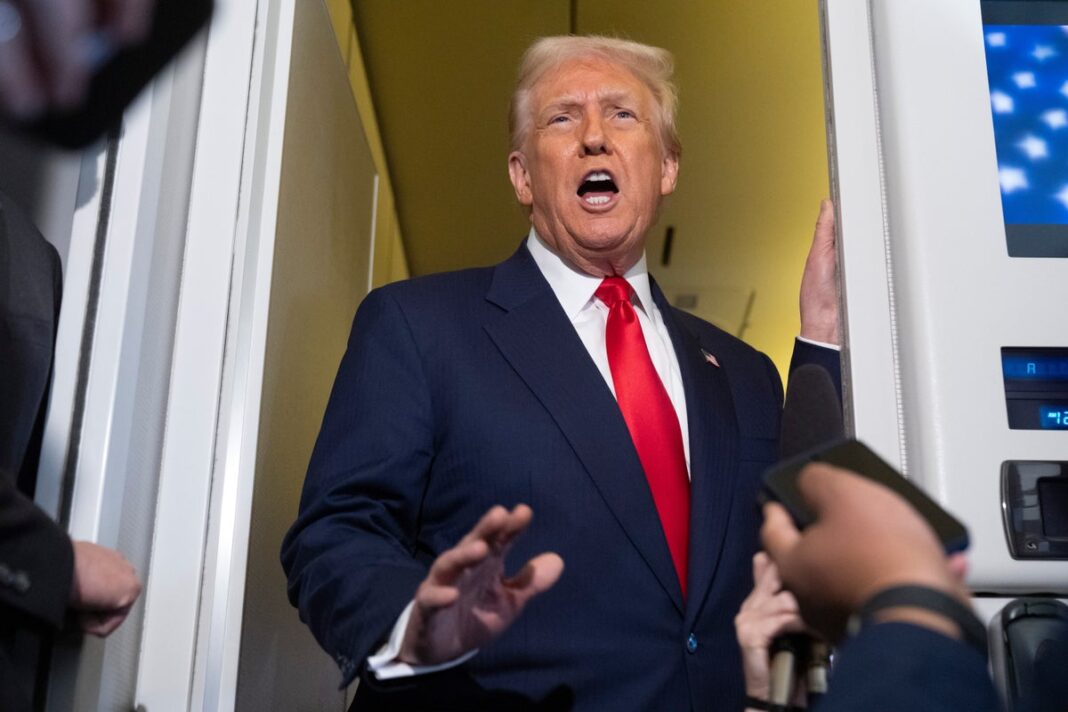The Nuclear Option: Trump’s Call to Eliminate the Filibuster Amid Government Shutdown
In the turbulent landscape of American politics, the debate surrounding the filibuster has resurfaced with increased urgency. Recently, former President Donald Trump urged Congressional Republicans to invoke what he termed the “nuclear option” to eliminate the filibuster and put an end to the ongoing government shutdown, which is now in its 31st day.
The Filibuster Explained
The filibuster is a Senate procedural rule that requires 60 out of 100 senators to agree on most legislation, effectively allowing a minority party to stall the legislative process. Currently, with Republicans holding a 53-47 majority in the Senate, legislation can be blocked if party lines are firmly drawn. Traditionally, this has been a point of contention; while some view it as a necessary tool for preserving minority rights, others criticize it as an obstructionist tactic that hampers legislative progress.
The Government Shutdown
The current government shutdown has drawn attention to the filibuster and its implications. As funding for various government operations ceases, the Democratic party has been accused of using the filibuster to prolong the halt, demanding a reversal of Medicaid cuts and an extension of Affordable Care Act subsidies. In contrast, Republicans have claimed that Democrats are seeking to provide free healthcare to undocumented immigrants—a narrative widely recognized as misleading.
Trump’s commentary pivoted around the urgency of the situation. He argued that the filibuster prevents Congress from operating efficiently, stating, “It is now time for the Republicans to play their ‘TRUMP CARD’ and go for what is called the Nuclear Option.” In his lengthy Truth Social post, he maintained that the elimination of the filibuster would allow Republicans to swiftly address the shutdown’s effects on American citizens.
A Shift in Republican Sentiment
Historically, many Republicans have been hesitant to alter or abolish the filibuster, as it could backfire when the political tides turn. However, as the shutdown drags on, some GOP leaders are beginning to reconsider their stance. House Speaker Mike Johnson and other prominent Republicans have shown signs of empathy towards Trump’s call, indicating an emerging consensus that may lean towards invoking the nuclear option.
A notable supporter is Congresswoman Marjorie Taylor Greene, a staunch Trump ally, who has long urged for a change in Senate procedures. On social media, she reiterated her position: “Since Democrats REFUSE to fund the government, Senate Republicans need to use the nuclear option and override the filibuster!!” Such sentiments reflect a growing impatience among certain Republican factions who are eager to see tangible progress rather than political stalemate.
Economic Implications of the Shutdown
The protracted shutdown carries substantial economic ramifications. Estimates from the nonpartisan Congressional Budget Office suggest that the shutdown could cost the U.S. economy anywhere between $7 billion and $14 billion. This economic pressure adds urgency to the ongoing political debates, as lawmakers grapple with the consequences of their decisions on ordinary citizens—many of whom are facing critical issues such as food insecurity and disrupted services.
Republican Senator Josh Hawley succinctly articulated this sentiment, emphasizing, “I’m not willing to see children in my state go hungry, which is literally happening now, over some Senate procedure.” His remarks underscore the increasing frustration among some Republicans with the political maneuvering that leads to real hardships for the American populace.
Trump’s Historical Disdain for the Filibuster
Trump’s perspective on the filibuster is not new; he has expressed his disdain for the mechanism since his first term in office. He previously described it as “not fair” and “not a good concept to start off with” during an interview with Fox News in 2017. His long-standing criticisms highlight a consistency in his approach, framing it as an obstruction that hinders effective governance.
The Possible Future of the Filibuster
As the government shutdown continues, the pressure is mounting for lawmakers to resolve the stalemate. Discussions surrounding the nuclear option offer a glimpse into potential shifts in Senate dynamics. While some senators have shown resistance to making such dramatic changes to Senate rules, the ongoing crisis could prompt a reevaluation of traditional practices.
While Trump’s call has gained traction among certain factions, it remains unclear whether Congressional Republicans will unify around this controversial tactic. The implications of such a decision would resonate throughout American politics, potentially altering how future legislations are navigated and passed.
In a polarized political environment, the fate of the filibuster and the future of the government remain uncertain, with citizens keenly watching as their representatives navigate these critical issues.



